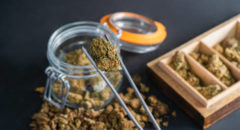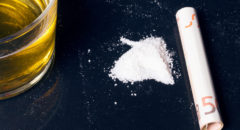
In a shocking revelation, acclaimed rapper Nicki Minaj disclosed her personal battle with addiction in Vogue’s new December cover story. Her addiction stems from her prescription of Percocet for menstrual cramps.
Her revelation sheds light on the often underestimated risks associated with prescription medications and the challenges individuals face in navigating the fine line between pain management and addiction.
“No one told me that this was a narcotic and this was addictive,” the 40-year-old told Vogue, adding that she began taking the drug even when she wasn’t in pain. “Luckily I was able to ground myself. But — once an addict, always an addict. I feel like if you’ve ever experienced addiction to anything, which I have, you always have to think twice and three times about the choices that you make.”
The rapper also opened up about how her late father, Robert Maraj’s addiction to crack cocaine during her childhood shifted her perspective on substance abuse. Before her Percocet use, the “Pink Friday” rapper made an effort to steer clear of drugs — and drink very little — due to her father’s addiction, Daily News notes.
“I feel like I will always consider myself to be just like my father,” Minaj says.“I think about watching my father go back and forth, and I just wish that at the time I understood that he wasn’t doing it because he wanted to. Now I realize, those people weren’t making those choices because they wanted to hurt their family. Addiction took over their bodies and their lives. They were victims too.”
Minaj also touched on the deep-rooted connection between substance abuse and fame. “Look at some of our biggest celebrities,” she adds. “They eventually either get laughed out of wanting to go outside anymore, like Michael Jackson, or criticized, like Whitney Houston, or they fight silent battles, like Prince. These are some of the greatest of all time.”
The Importance of Responsible Prescribing
Minaj’s story highlights a common but often overlooked issue – the potential for addiction when prescribed powerful painkillers. Percocet, a combination of oxycodone and acetaminophen, is commonly prescribed for moderate to severe pain. What may begin as a seemingly harmless solution to alleviate pain such as menstrual cramps can escalate into a serious dependence on the drug.
The euphoria-inducing effects of these medications can create a false sense of well-being, leading users to seek them out even when the initial cause for prescription has resolved. This is where exploring healthier alternatives becomes paramount.
RELATED: 8 Ways to Recognize the Signs of an Opioid Addiction
Healthier Alternatives for Menstrual Pain
As we applaud Minaj’s resilience, let her story serve as a reminder to prioritize safer, non-addictive methods for managing pain and to collectively work towards fostering a healthier, more informed society. If you are experiencing menstrual pain, these healthier alternatives may help:
- Non-prescription Pain Relievers: Over-the-counter pain relievers such as ibuprofen or naproxen sodium can effectively alleviate menstrual cramps without the risk of addiction associated with opioids.
- Heat Therapy: Applying heat to the lower abdomen through a hot water bottle or heating pad can provide relief by relaxing the muscles and reducing pain.
- Regular Exercise: Engaging in regular physical activity can help manage menstrual pain by promoting blood circulation and releasing endorphins, the body’s natural pain relievers.
- Dietary Changes: Adopting a diet rich in anti-inflammatory foods, such as fruits, vegetables, and omega-3 fatty acids, can contribute to reducing menstrual pain.
- Herbal Teas: Some herbal teas, like ginger or chamomile, are known for their anti-inflammatory and soothing properties, offering a natural way to alleviate discomfort.
What to Do If You Develop an Addiction
If you or someone you know develops an addiction, it’s crucial to seek help promptly. Here are steps to consider:
- Reach Out for Support: Share your struggle with friends, family, or a trusted individual who can provide emotional support.
- Consult Healthcare Professionals: Seek guidance from healthcare professionals, such as a doctor or addiction specialist, who can help create a personalized recovery plan.
- Explore Rehabilitation Programs: Consider rehabilitation programs, which may include counseling, support groups, and medical assistance to address the physical and psychological aspects of addiction.
- Establish a Support System: Build a strong support system that may involve friends, family, or support groups to provide encouragement and accountability during the recovery process.
- Educate Yourself: Learn about addiction, its causes, and effective coping mechanisms to better understand and manage the challenges associated with recovery.









